November 30, 2021
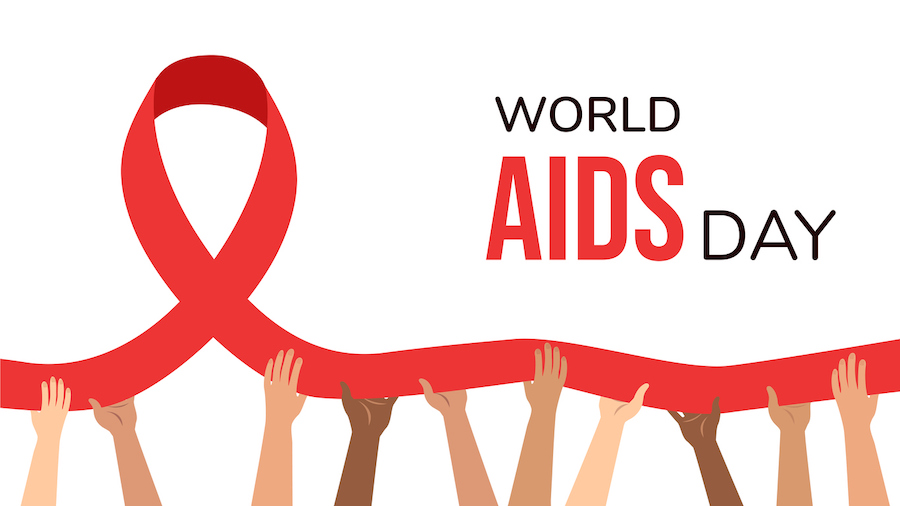
This World AIDS Day, December 1, UNAIDS is focusing on the HIV/AIDS epidemic in the context of intersectional societal and global health challenges. This year's theme — "End Inequalities. End AIDS. End Pandemics." — brings attention to the inequalities that are hindering progress in AIDS and COVID-19 pandemics. This year also marks the 40th anniversary since the first official cases of AIDS were detected, and although the world has not fully eradicated HIV/AIDS, great progress has been made in the decades since.
Ciheb remains steadfast in its mission to improve the human condition globally, safeguard communities against health-related threats, and promote health equity worldwide. In the last year, our country office teams across eight sub-Saharan Africa countries have continued their work in health service delivery amidst challenges posed by COVID-19, implemented population-based impact assessments in Botswana and Zambia that will advance both countries toward target goals, and accredited laboratories and improved laboratory capacity.
Our country directors have highlighted their teams' ongoing work and accomplishments below.
Botswana
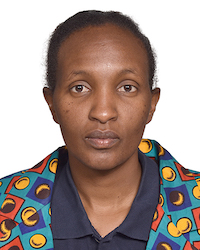 By Interim Country Director Reson Marima, MD
By Interim Country Director Reson Marima, MD
The COVID-19 pandemic has changed the landscape of our society in so many ways, but our commitment to reining in the AIDS epidemic remains the same. Botswana is one of the most affected countries in the world by HIV/AIDS, but the country has also achieved great progress toward the 95-95-95 goals.
To achieve epidemic control, we must continue our last mile interventions that Ciheb and our local partner Bummhi have been engaged in. Currently this includes the Accelerating Botswana through the Last Mile to Epidemic Control (ABLE) project, in which Ciheb provides data-driven technical assistance to the Ministry of Health and Wellness through a variety of national strategies including high yield HIV case finding, immediate ART initiation, and viral load monitoring of HIV clients, among others. In addition, this scope includes prevention and laboratory system strengthening to improve the clinic laboratory interface.
We must also have up to date data to measure Botswana’s progress toward epidemic control. In the last year, Ciheb under the leadership of the Government of Botswana through the National AIDS and Health Promotion Agency (NAHPA) and with other partners including Statistics Botswana, the Ministry of Health and Wellness, and CDC, conducted the fifth Botswana AIDS Impact Survey (BAIS V). This ordinarily massive undertaking was made more challenging to execute by the COVID-19 pandemic. BAIS V is a cross-sectional, household-based, nationally representative survey that assessed the prevalence of key HIV-related health indicators. BAIS V was originally scheduled for 2020 but paused due to the onset of the pandemic and restarted in March 2021 and completed in August of the same year.
We are pleased to announce preliminary data from BAIS V is available on World AIDS Day. These preliminary results will be announced by His Excellency Dr. Mokgweetsi E. K. Masisi, the President of the Republic of Botswana. We expect the full results in 2022.
Despite the challenges COVID-19 has dealt us, I have seen great resolve in our staff to continue COVID-safe HIV service delivery and carry out the BAIS V survey so as to deliver on our collective mandate to improve the human condition, globally.
Kenya
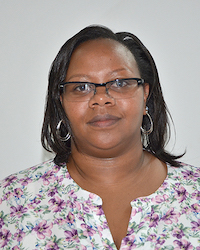 By Acting Country Director Caroline Ng'eno, MD
By Acting Country Director Caroline Ng'eno, MD
Sub-Saharan Africa is no stranger to inequality. It is the epicenter of the HIV/AIDS epidemic, which is exacerbated by the wealth and access disparity that most of these countries experience. Addressing this inequality has been one of the driving factors for Ciheb/UMB’s work in Kenya. Through collaboration with the Ministry of Health, county governments, our donors, dedicated partners, and the brilliant work of our staff, we often have exceeded the targets set for us and those we set for ourselves. This has resulted in improved facilities, staff expertise, and client experience.
The need for expansion of, and innovation in, HIV prevention, and the care and treatment of people living with HIV has never been more apparent than today in the face of the COVID-19 pandemic. The negative effect on the global economy resulted in shortages of various commodities (diagnostics and medication) necessary for effective client service delivery. Risk of infection with the coronavirus, as well as inability by clients to follow COVID-19 protocols such as buying masks or accessing the vaccine, posed an increased risk to our clients. I must applaud our staff and partners who maintained their stellar output in the face of such odds, going above and beyond their call of duty, which ensured that they and the clients they serve were safe and continue to live the best lives possible.
Continued innovation in care and treatment will enable all players in the health sector to end inequalities and better serve at risk populations, such as adolescents and young people. The national theme for this year focuses on adolescents and young people, specifically teenage pregnancies, and we echo this by continuing our work with our partners to ensure all youth and young mothers receive the highest quality of care.
This year’s World AIDS Day theme is “End Inequalities. End AIDS. End Pandemics.”, and it is in perfect harmony with Ciheb/UMB’s mission, improving the human condition globally. Although we closed out three programs in September, we are ecstatic to continue our work in improving the lives of Kenyans in partnership with Ciheb-Kenya having won four new grants. We celebrate the progress made in Kenya, Africa, and globally in the fight against HIV. This December 1, we also look to a future where HIV epidemic control is a reality and no one is left behind.
Malawi
 By Country Director Thoko Kalua, MBBS, MSc
By Country Director Thoko Kalua, MBBS, MSc
Over the last year, Ciheb Malawi has made great strides in playing its part to end pandemics. We supported molecular testing and genetic sequencing for SARS-CoV-2 testing, while also ensuring minimal disruption to HIV viral load and early infant diagnosis testing. Four of the laboratories that we supported through the AMPLIFY project received ISO 15189 accreditation, marking a significant milestone in our work as global health contributors. In the spirit of the UNAIDS theme, we are indeed contributing to ending both the COVID-19 and AIDS pandemics.
As I begin my first year as Malawi Country Director at Ciheb, I am proud to continue the work already begun here. We have our sights set on accrediting eight more laboratories, and the first four have laid the blueprint for us to eventually accomplish that. As we improve the quality of laboratory services to international standards, and with the use of strategic information, we will be able to greatly increase testing capacity, reducing inequalities to access to critical testing services.
Over the years, more people know their HIV status, the differences between age and sex have narrowed, and improvements have happened in all regions of the country. More importantly, the UNAIDS 90:90:90 treatment targets have been achieved! We are glad and privileged to stand beside the Malawi Ministry of Health and to be part of the efforts to sustain and build on these tremendous successes as we forge into the future.
Mozambique
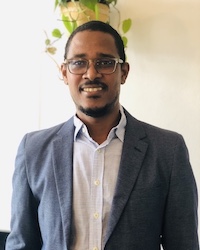 By Country Director Dinis Jaintilal, PGDipPH
By Country Director Dinis Jaintilal, PGDipPH
The COVID-19 pandemic has brought global medical inequality into focus. Over the past two years, the developing world has had to contend with vaccine and personal protective equipment shortages alongside HIV epidemic control setbacks. This has meant increased stress on systems and staff as they try to maintain the gains made in HIV control with less resources.
While this has caused some setbacks, it has allowed Ciheb Mozambique to transfer our knowledge in HIV and TB to COVID-19 diagnosis through our Laboratory Systems Enhancement for AIDS Pandemic Control (LAPSEC) project. We have also worked to expand COVID-19 testing to the sub-national level using the GeneXpert platform. This meant the people in Mozambique have been able to get tested and take the necessary precautions thereafter. We have continued our work in HIV and TB patient diagnosis, care monitoring, and related services as we progress towards meeting the WHO’s 95-95-95 goals.
This year, we call for bold action against inequalities that would put the lives of people living with HIV in danger. Ciheb Mozambique is committed to personifying this year’s World AIDS Day theme of “End Inequalities. End AIDS. End Pandemics.” Through our work in supporting the Mozambique Ministry of Health, we will strive to be an example in strengthening laboratory systems for the diagnosis of HIV and tuberculosis (TB). We call upon all our partners at home and abroad to commit to action in the pursuit of parity. It is only through this that we can one day have a world free of HIV.
Nigeria
 By Country Director Sylvia Adebajo, PhD, MBBS, MPH, MSc
By Country Director Sylvia Adebajo, PhD, MBBS, MPH, MSc
This year’s theme for World AIDS Day – End inequalities. End AIDS. End pandemics – brings to light the inter-relationship between inequities, diseases, and pandemics. Nigeria has, in recent times, made tremendous progress in the control of the HIV epidemic with the implementation of data-driven programming, innovations, and interventions. However, to meet the ambitious 95-95-95 UNAIDS targets set by the global community, efforts need to be amplified to eliminate barriers to achieving HIV outcomes and sustain the progress made thus far in the journey towards HIV epidemic control.
The emergence of the COVID-19 pandemic triggered a new dimension in the management of HIV as we knew it. Introducing service disruptions and elucidating disparities, it exposed the need for differentiation to effectively address the needs of those living with and affected by HIV. Most studies to understand the epidemiological factors surrounding SARS-CoV-2 exposure and the incidence of COVID-19 cases are suggestive of an increased risk of COVID-19 infection and mortality in individuals with underlying health conditions and compromised immune systems; thus, inferring increased risk for people living with HIV (PLHIV). While COVID-19 safety guidelines and preventive measures have limited physical gatherings for capacity building, Ciheb Nigeria leveraged Project ECHO for the exchange of up-to-date practice-based education and best practices to transfer knowledge among health providers caring for PLHIV.
As an above-site partner, Ciheb Nigeria works closely with the Government of Nigeria to strengthen the implementation of HIV programs across the country and in turn improve the quality of service delivery, despite the ongoing pandemic. Through active reporting, monitoring and evaluation of data collected in the national data repository, a database of de-identified patient-level data from facilities treating PLHIV across the country, significant patterns and trends were identified and applied towards strategic decision-making. Despite the ongoing pandemic, Ciheb Nigeria introduced enhancements to improve data upload and quality assurance processes to enable partners upload their data more effectively. In the last year, the number of unique patient records captured in the National Data Repository (NDR) has increased to over 5 million records with over 1.6 million active patients currently on treatment compared to about 1.2 million at about this time last year.
With the introduction of a patient biometric system to improve client identification, Ciheb Nigeria has alleviated the occurrence of duplication of clients in the system, thereby improving the efficiency of the resource allocation process and reducing the potential for fraud and waste in the system. To increase the reach of HIV programs and improve access to care, geospatial mapping was introduced to “go where the virus is” by informing hotspots” for targeted testing of index cases associated with confirmed recent infections identified through HIV recent infection testing. Incidentally, the results of HIV recency testing thus far reported a higher proportion of recent HIV-positive clients among key populations tested; another indicator of the need to promote strategies to expand access to HIV prevention, care, and treatment services to these under-served populations. Although the management and implementation of the NDR was recently transitioned to the Government of Nigeria through a new funding mechanism, we are confident that through the implementation of these, alongside other innovative approaches, Ciheb Nigeria has contributed significantly towards the achievements of the UNAIDS targets.
This year, exactly 40 years since the discovery of the index cases of AIDS, we in Ciheb Nigeria re-commit our efforts to bringing an end to the scourge of HIV/AIDS by 2030, confronting the inequalities that have propagated HIV/AIDS in the past, and ensuring that all in need have access to quality preventive, care, and treatment services.
Rwanda
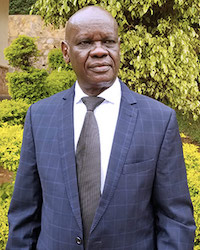 By Country Director Cyprien Baribwira, MD
By Country Director Cyprien Baribwira, MD
Rwanda has reached tremendous achievements in controlling the HIV epidemic, and collaboration has been an important pillar in addressing inequality in HIV service delivery. Ciheb Rwanda has continued its close working relationship with the Rwanda Ministry of Health and CDC Rwanda. We are proud of the numerous milestones we have reached with these and other partners, as well as the high-quality HIV services that the people of Rwanda continue to receive as a result. A testament to these collaborations is that these standards were maintained in the face of the COVID-19 pandemic that affected so many facets of daily life.
We remain committed to Ciheb and the University of Maryland, Baltimore’s mission to improve the human condition globally, particularly for the people of Rwanda. We closed out our five-year Imakaza project in November 2021 but continue to ensure its sustainability by assisting with the transition process. We also continue our work in addressing HIV in young women and children with funding from UNICEF.
World AIDS Day provides all those who are involved in the fight against HIV/AIDS with an opportunity to celebrate the progress made in Africa and globally. The work and dedication needed to bring us this far can’t be understated. The day also serves as a rallying point for all of us to push forward towards the next goal of epidemic control. If we are to end HIV/AIDS by 2030 and tackle the inequalities that would hinder this, we will require transformative change that comes from everyone working towards these goals.
Tanzania
 By Country Director Abubakar Maghimbi, MD
By Country Director Abubakar Maghimbi, MD
I wrote last year on World AIDS Day that the fight against the HIV pandemic in Africa has been a long journey. So much has changed in the last year, but that sentiment still rings true, particularly considering the twin pandemic of COVID-19.
In Africa, COVID-19 vaccinations lag behind the rest of the world, and just 10% of African nations are projected to meet targets of fully vaccinating 40% of their population. The vaccine inequality will ultimately hinder the recovery from COVID-19 and it will prolong our journey toward epidemic control of HIV/AIDS.
But despite the new obstacles, HIV/AIDS progress will persevere and progress in Tanzania continues moving forward. This year, we celebrated five years of work that Ciheb Tanzania has contributed through the Reaching, Engaging, and Acting for Health (REACH) project. REACH worked in 11 regions to provide technical assistance through improving uptake of data and evidence for faster HIV epidemic control.
REACH also implemented Project ECHO in which we ran HIV ECHO Clinic as well as Continuous Quality Improvement ECHO Clinic. These became an essential knowledge-sharing platform because of COVID-19. We expanded to include a pediatric ECHO hub as well in the last year. Apart from running the ECHO Clinics, REACH also had a Project ECHO national Coordination role where we successfully worked with the Ministry of Health to come up with the first ECHO framework.
We remain on this long journey toward epidemic control, and we will continue until all targets are reached.
Zambia
 By Country Director Robert Sheneberger, MD
By Country Director Robert Sheneberger, MD
At the juncture of World AIDS Day 2021, we face some unique and critical challenges globally and within Zambia. These challenges are captured in the theme "End Inequalities. End AIDS. End Pandemics." The University of Maryland, Baltimore, through Ciheb Global, is addressing these challenges in Zambia in multiple targeted areas.
Briefly, the challenge to ending AIDS and inequities in HIV care and treatment is tightly linked to reaching the ‘last mile’ populations. If key populations, such as female sex workers, men who have sex with men, drug users, transient workers, and adolescents are not brought into and retained in prevention and treatment programs for HIV, we will not achieve our goals and end AIDS. These populations have been marginalized and face large barriers to obtaining and maintaining quality health care due to stigma, criminality, and neglect. These ‘last mile’ populations all interact with the general populations groups with potential of increasing new HIV infections among populations believed to be ‘controlled.’ Failure to reach and incorporate these populations into sustainable care has the potential to not only keep us from achieving our goals, but actually push the pandemic backwards. This challenge is encompassed by a new pandemic caused by SARS-CoV-2, that is being fought from a completely different paradigm in much of the world. HIV is managed through aggressive community case finding incorporating index testing and engagement in immediate treatment or prevention measures based on testing status to prevent progression. Meanwhile, COVID-19 has no defined treatment plan in resource-limited settings for clients with early disease, poor use of community and contact tracing, and heavy reliance on vaccination programs that have been slow to roll out with poor uptake among under-resourced nations. HIV programs have been proactive, while COVID programs have been more reactive.
In Zambia, our CIRKUITS grant, which is led by the PI Dr. Cassidy Claassen and supported by a subcontract to Ciheb Zambia led by Dr. Lottie Hachaambwa, we are strategically targeting the challenges of ‘last mile’ populations. Our DREAMS program is making significant inroads into reaching adolescents through multiple integrated and layered services designed to educate adolescents, keep them in school, provide economic strengthening activities, work with church leaders, and specialized programs for youth such as ‘Coaching Boys into Men.’ It has been extremely successful in increasing the numbers of adolescents reached with prevention messages and interventions such as PrEP and family planning, as well as expanding testing and treatment HIV services. We have partnered this year with Key Population Community Service Organizations (KP CSOs) to reduce barriers to reaching and supporting key populations. Through supporting KP CSOs we believe we create more effective and sustainable strategies to reach these marginalized populations, while utilizing UMB’s extensive experience in grant and program management to build capacity of these newly formed local organizations.
Lastly, UMB though Ciheb Global is positioned to provide technical recommendations on how to synergize the approach to two different, co-existing pandemics with the greatest gain in efficiencies using our broad experience in managing public health emergencies. Our goals for this coming year are to reduce inequalities in HIV care and treatment, advance HIV epidemic control, and apply lessons learned from decades of public health HIV management to the current COVID pandemic.
Contact
Center for International Health, Education, and Biosecurity
Institute of Human Virology
Anthony Okoth
Regional Communications Specialist
Related stories
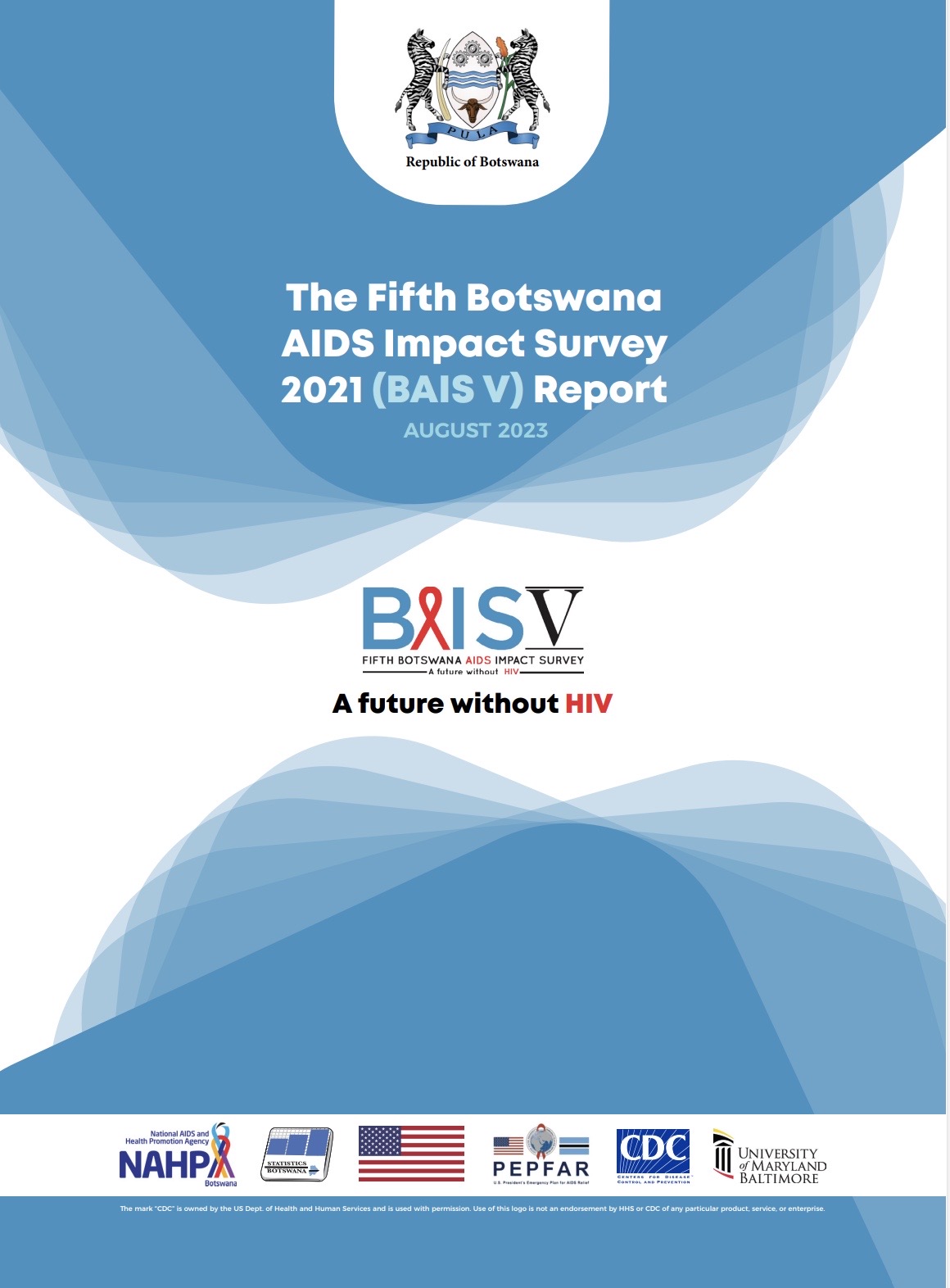
Tuesday, September 19, 2023
BAIS V Report Launched
The Fifth Botswana AIDS Impact Survey (BAIS V) Report 2021 is a nationally representative household-based survey conducted between March and August 2021. Its main aim was to provide information on national and district-level progress towards achieving key HIV targets.
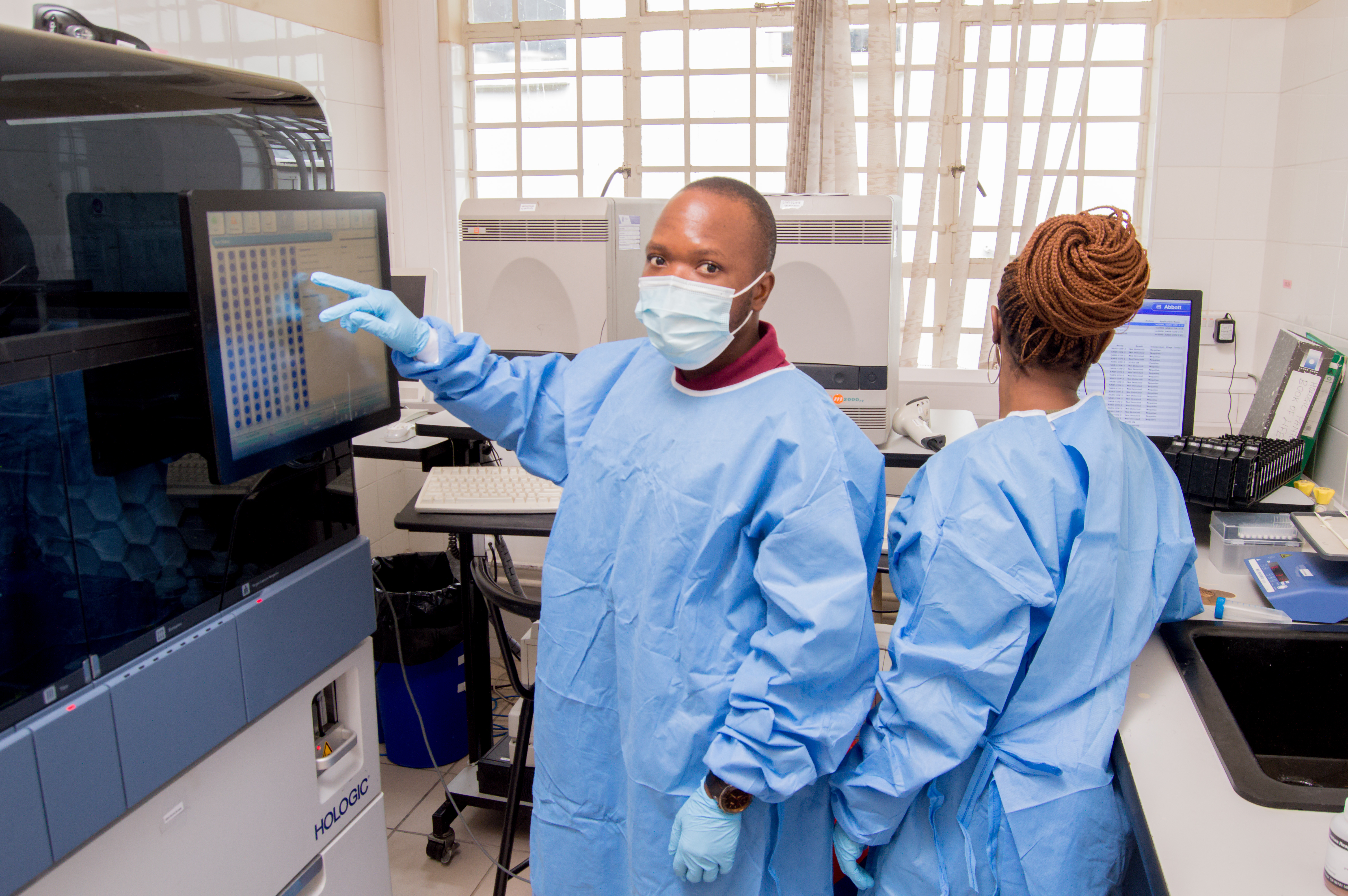
Friday, July 14, 2023
Addressing Unprocessed HIV Viral Load Samples Backlog in Malawi
The health sector in Malawi was faced with a pressing backlog issue of unprocessed HIV viral load samples. These had accumulated due to reagent stockouts and persistent power outages in the country.

Friday, July 07, 2023
The Intersection of Non-Communicable Diseases and HIV: Opportunities for Botswana to Lead the Response
For a country like Botswana with a high HIV burden, integration of healthcare services is vital to provide comprehensive interventions. Lifestyle factors such as tobacco smoking, alcohol use, unhealthy diet, and physical inactivity heighten the risk of developing NCDs for people living with HIV.

Friday, July 07, 2023
BSMART Study Launch: Combating Smoking Among HIV-Positive Individuals In Botswana
BSMART focuses on identifying effective interventions for HIV-positive individuals who smoke. The launch of the BSMART Study signifies a significant step forward in tackling tobacco use among HIV-positive individuals in Botswana.
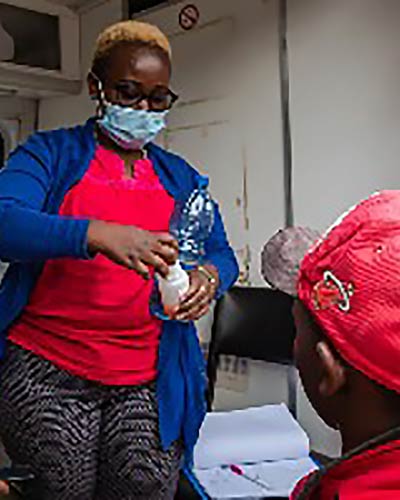
Monday, October 03, 2022
Medically Assisted Therapy Clinic in Kenya Empowers Women
In Nairobi, Ciheb’s PACT Endeleza program, with the assistance of the University of Maryland, Baltimore, and Nairobi City County, established medically assisted therapy (MAT) clinics to reduce the spread of HIV among people who inject drugs (PWID) and provide opioid substitution therapy (OST). These clinics in Mathari and Ngara were established with funding from the President’s Emergency Plan for AIDS relief through the U.S. Centers for Disease Control and Prevention.
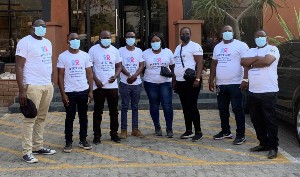
Tuesday, September 20, 2022
National HIV Testing, Counselling, and Treatment Day in Zambia
Zambia remains one of the countries that the HIV and AIDS epidemic hard hit. These factors necessitate spreading awareness of the importance of testing and treatment among Zambians.
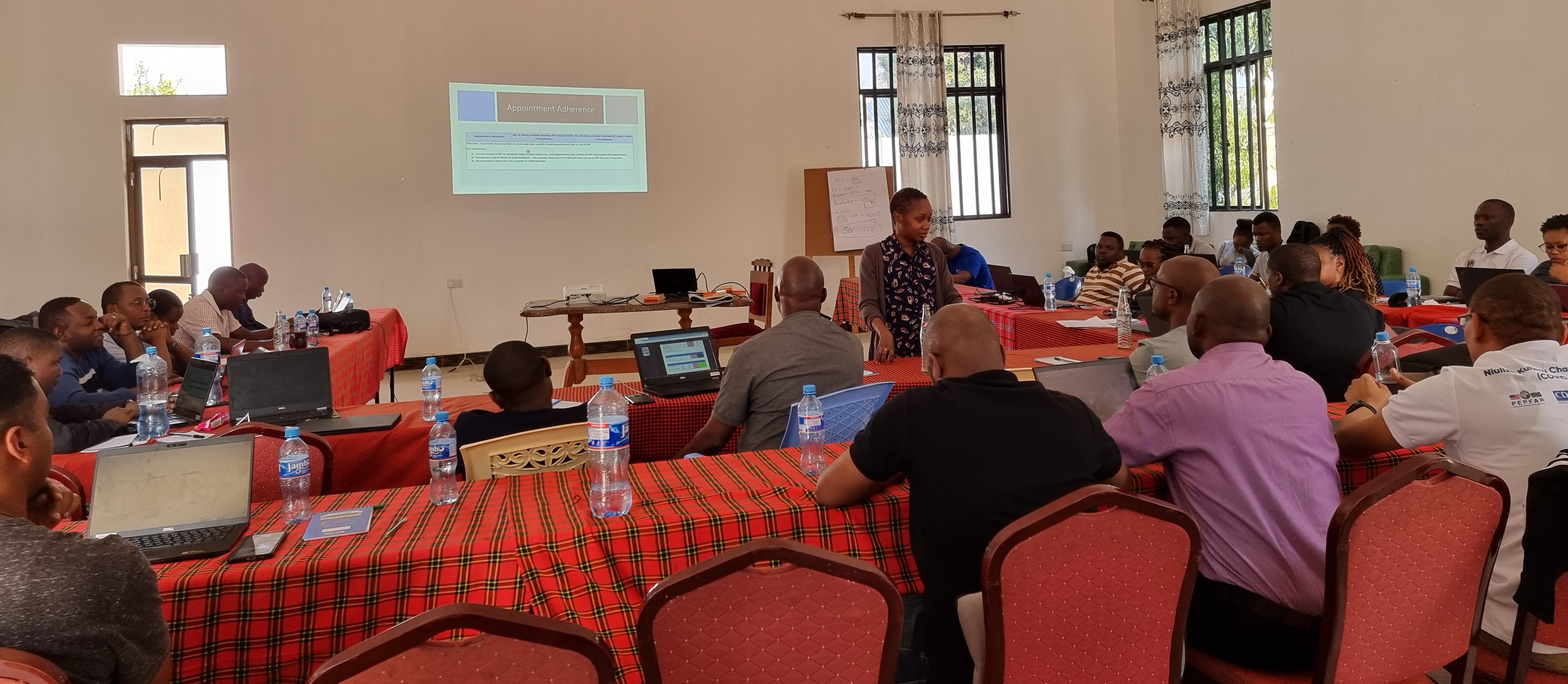
Monday, August 15, 2022
UMB's Ciheb Tanzania Holds CQI Indicators Workshop
Adopting Continuous Quality Improvement (CQI) processes is an approach for accelerating progress towards attainment of the 95-95-95 global HIV targets.
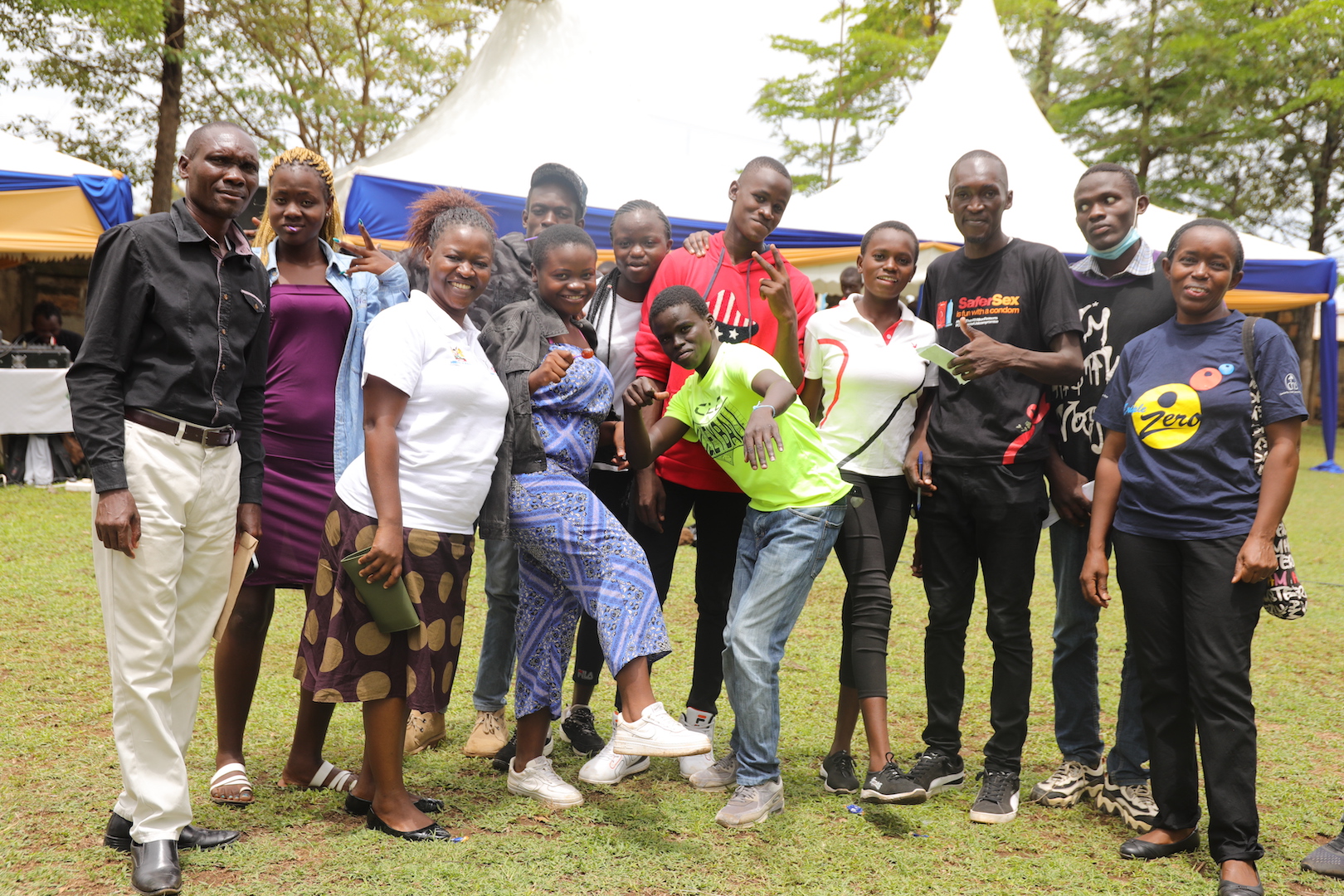
Monday, July 18, 2022
Operation Triple Zero Fun Days Held in Kenya
The OTZ Day participants, drawn from facilities within the counties, presented dances and skits themed on adherence to clinical appointments, medication, and viral suppression.
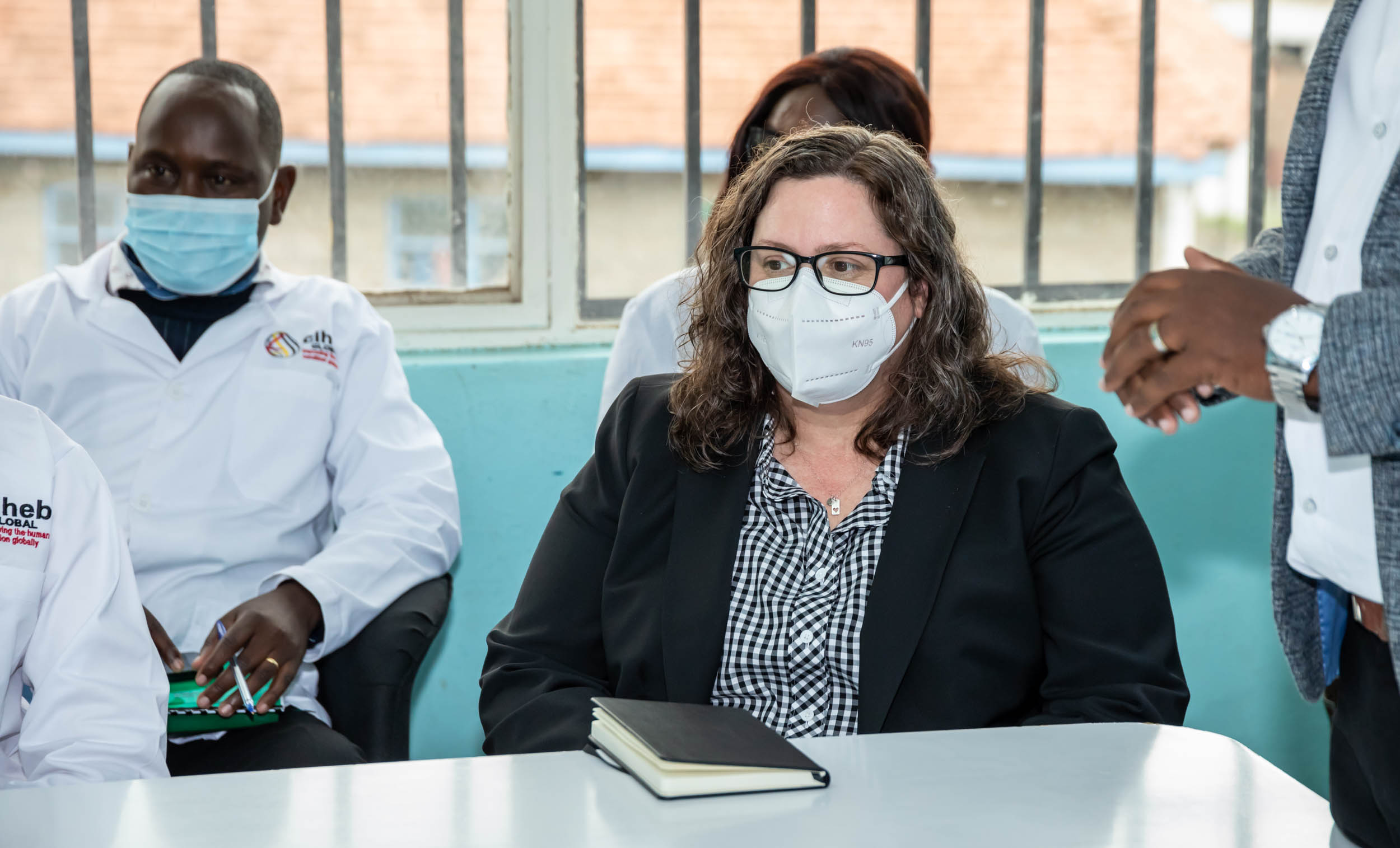
Friday, July 15, 2022
Ciheb Leadership Visits Nairobi Centers of Excellence
Dr. Kristen Stafford, Associate Professor at the University of Maryland, Baltimore (UMB) and Deputy Director of Ciheb Global, visited the Nairobi Centers of Excellence on a week-long tour in May 2022.

